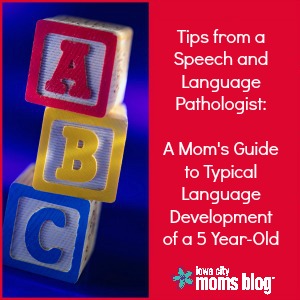I have enjoyed compiling this series on speech and language development in young children. It is nice to think that I may be helping provide you with a bit of insight as to what to look for in your developing child. This has also been fun for me to review, as I have a talkative two-year-old and it is neat to really sit down and think about what skills she has, is developing, is lacking, etc. We have covered how to build language in babies and toddlers, and typical language development for two-year-olds, three-year-olds, and four-year-olds. Read on for the final entry in this series: five-year-olds!
Speech Sound Development
Let’s do this a bit differently, shall we? Instead of writing the long list of sounds your five-year-old should be able to say, let me provide a bit of insight on the sounds it is OK for your child NOT to say correctly. Here goes…
It is quite possible that your five-year-old will not be able to say:
r, l, s, ch, sh, j, v, z, th (both voiced, as in “them”, and voiceless, as in “think”)
I want to make a point to say that I have been known to address /l, s, ch, sh, v/ with five-year-olds. It all depends on the types of errors, degree to which the errors impact intelligibility (e.g. What if the kiddo is named “Charlie?”), and whether or not the child is even able to produce the sounds when given models and cues.
It is expected that your kiddo will be 90-100% intelligible to all listeners by the age of five. If you find that this isn’t true for your child, consider an evalulation!
Please note that the following lists do not contain the information mentioned in my previous three posts. (linked above) Check out those lists in order to see all concepts, questions, etc. your child should understand or grammatical markers he/she should use.
Comprehension
At the age of five, your child should understand/do the following:
- understand basic opposites
- understand number concepts, more specifically 1-20
- understand left/right
- understand any question types that are posed (e.g. why? when?, etc.)
- repeat longer, more complex sentences
- follow three-step directions
Expression
At the age of five, your child will likely:
- have a vocabulary of 2,200-2,500 words
- use comparative adjectives such as big/bigger, short/shorter
- use yesterday and tomorrow when speaking (even if what he/she is talking about was actually a few days ago!)
- use ordinals such as first, second, third
- explain why items are the same/different
- use a wide variety of prepositions including middle, through, and near/nearest
- often use adjectives when speaking
Pragmatic (Social) Language
At the age of five, your child will likely:
- make promises
- use threats
- make purchases at stores
- choose own friends
- announce topic shifts during conversation
- engage in cooperative play such as completing a group project
- ask questions in order to obtain information
- ask meanings of words
Literacy
At the age of five, your child will likely:
- recognize letters and what sounds they make
- retell short stories
- begin to write letters and some words
- understand the orientation of words on a page (i.e. read left to right)
*Portions of the above lists come from Linguisystems: Guide to Communication Milestones, 2012 Edition.
Just as with four-year-olds, listing a few red flags for five-year-olds is nearly impossible. Because your child will likely be in kindergarten, it is possible that your child’s teacher will point out any concerns and/or contact the school’s SLP. In addition, if you or other listeners have great difficulty understanding your child, he/she has a hard time following directions or understanding various concepts, or you notice that your child just doesn’t seem to be able to relay information or talk like other children his/her age, consider an evaluation.
As I mentioned in a previous post, if you notice that your child stutters and it has persisted for over six months, an evaluation is recommended.
I hope that you found this series helpful. Whether you can mentally check off the above lists or they have caused you that twinge of concern in your gut, my intent was simply to provide you with information. You may feel overwhelmed by all of the lists that were included, although other SLPs may be thinking, “Why didn’t she mention that?!” Every child is SO different, and the information I have included could have been continued for pages and pages had I been so inclined. Consider this a brief overview, and if any concerns exist…seek out an evaluation!











